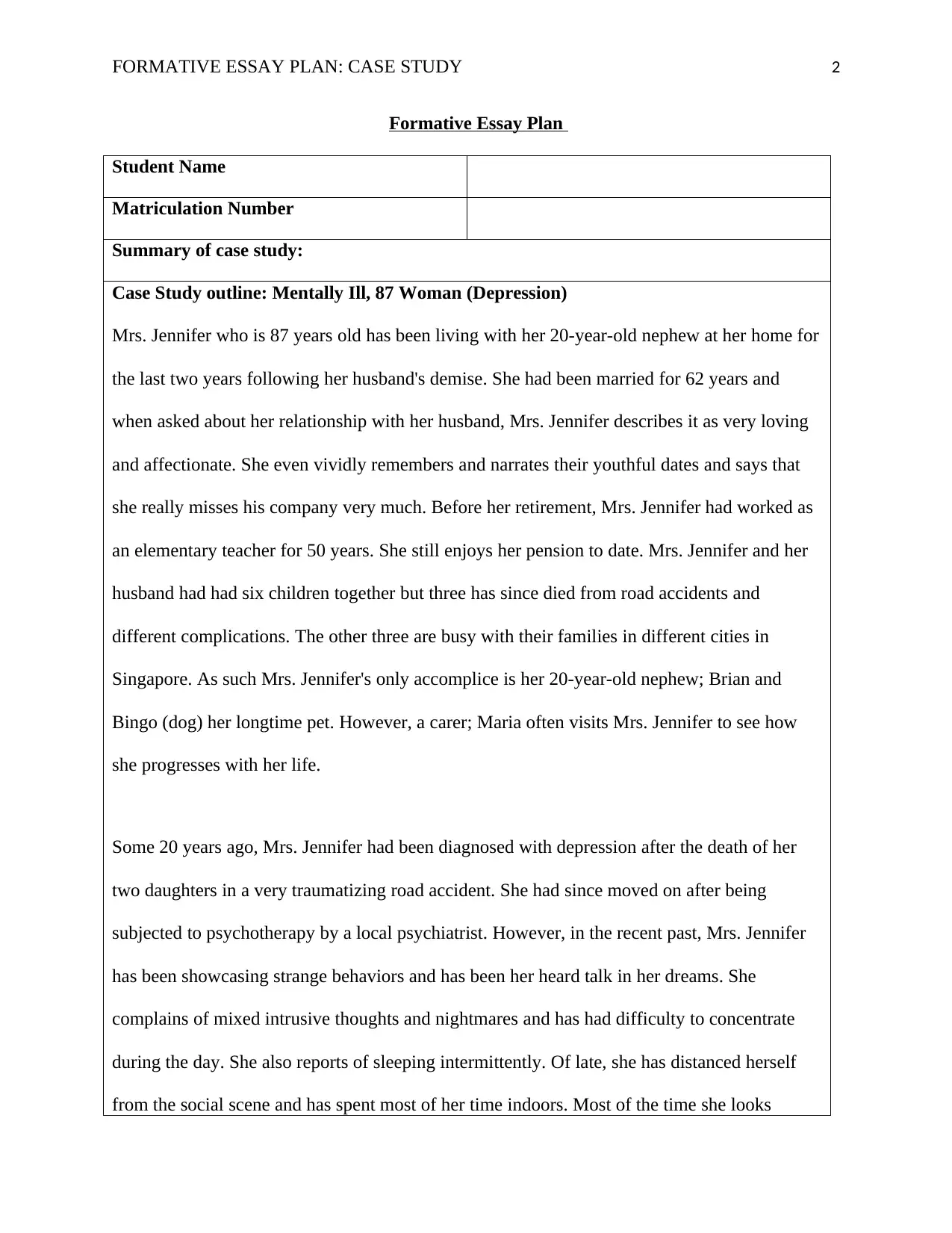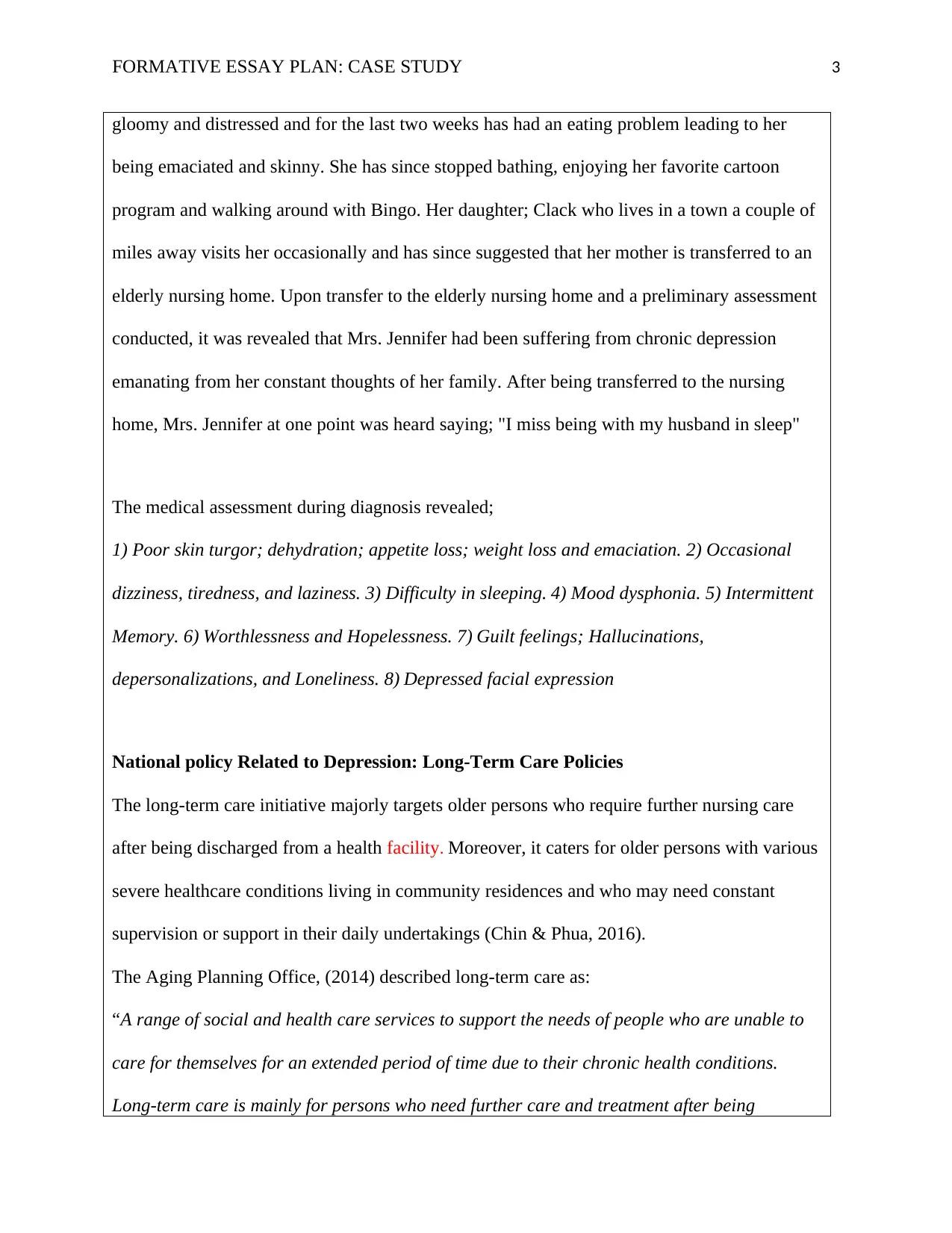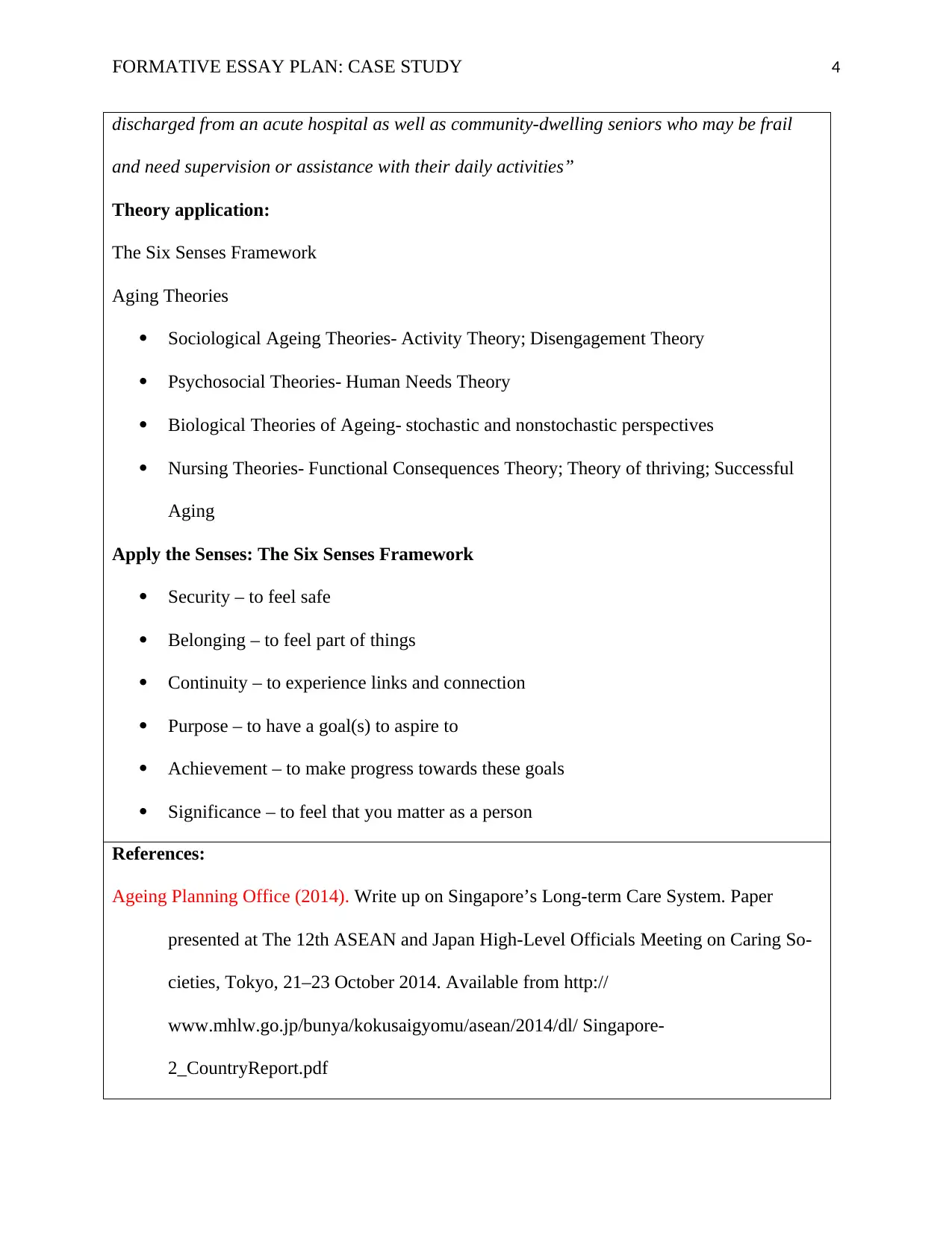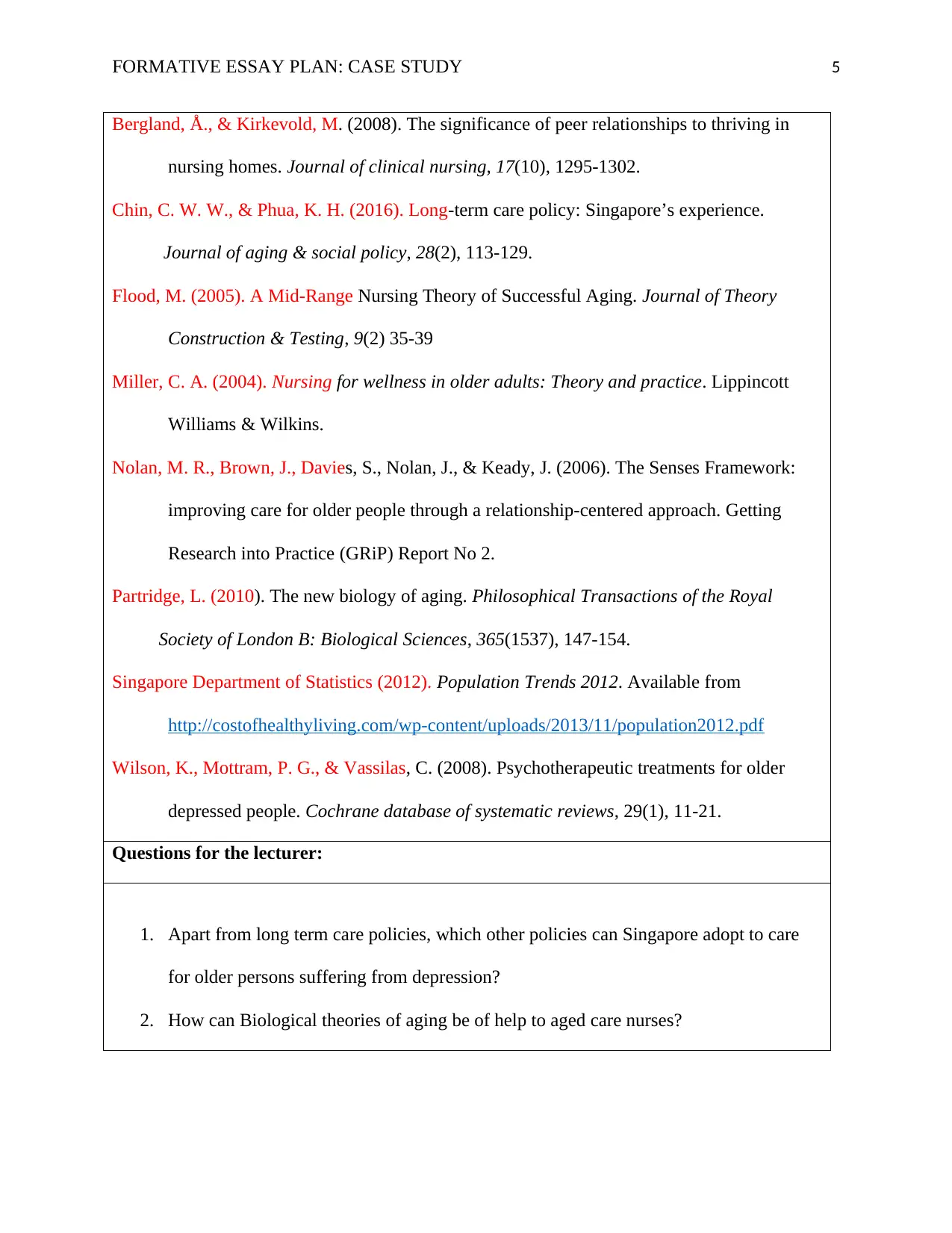Formative Essay Plan: Case Study 1 Analysis Report - Nursing
VerifiedAdded on 2021/05/31
|5
|1148
|48
Report
AI Summary
This report presents a formative essay plan based on a case study of an 87-year-old woman, Mrs. Jennifer, suffering from depression. The case study details Mrs. Jennifer's history, including her past experiences, recent behaviors, and current medical assessment, highlighting symptoms like poor physical condition, sleep disturbances, mood dysphoria, and cognitive issues. The report connects the case to relevant national policies, particularly long-term care initiatives for the elderly, and applies various theoretical frameworks such as the Six Senses Framework, sociological aging theories, psychosocial theories, and biological theories of aging to understand the patient's condition and care needs. The analysis includes a review of the patient's situation, related policies, and the application of theoretical models to provide a comprehensive understanding of the challenges and potential interventions for Mrs. Jennifer's depression.

Running Head: FORMATIVE ESSAY PLAN: CASE STUDY 1
Formative Essay Plan: Case Study
Name
Institution
Date
Formative Essay Plan: Case Study
Name
Institution
Date
Paraphrase This Document
Need a fresh take? Get an instant paraphrase of this document with our AI Paraphraser

FORMATIVE ESSAY PLAN: CASE STUDY 2
Formative Essay Plan
Student Name
Matriculation Number
Summary of case study:
Case Study outline: Mentally Ill, 87 Woman (Depression)
Mrs. Jennifer who is 87 years old has been living with her 20-year-old nephew at her home for
the last two years following her husband's demise. She had been married for 62 years and
when asked about her relationship with her husband, Mrs. Jennifer describes it as very loving
and affectionate. She even vividly remembers and narrates their youthful dates and says that
she really misses his company very much. Before her retirement, Mrs. Jennifer had worked as
an elementary teacher for 50 years. She still enjoys her pension to date. Mrs. Jennifer and her
husband had had six children together but three has since died from road accidents and
different complications. The other three are busy with their families in different cities in
Singapore. As such Mrs. Jennifer's only accomplice is her 20-year-old nephew; Brian and
Bingo (dog) her longtime pet. However, a carer; Maria often visits Mrs. Jennifer to see how
she progresses with her life.
Some 20 years ago, Mrs. Jennifer had been diagnosed with depression after the death of her
two daughters in a very traumatizing road accident. She had since moved on after being
subjected to psychotherapy by a local psychiatrist. However, in the recent past, Mrs. Jennifer
has been showcasing strange behaviors and has been her heard talk in her dreams. She
complains of mixed intrusive thoughts and nightmares and has had difficulty to concentrate
during the day. She also reports of sleeping intermittently. Of late, she has distanced herself
from the social scene and has spent most of her time indoors. Most of the time she looks
Formative Essay Plan
Student Name
Matriculation Number
Summary of case study:
Case Study outline: Mentally Ill, 87 Woman (Depression)
Mrs. Jennifer who is 87 years old has been living with her 20-year-old nephew at her home for
the last two years following her husband's demise. She had been married for 62 years and
when asked about her relationship with her husband, Mrs. Jennifer describes it as very loving
and affectionate. She even vividly remembers and narrates their youthful dates and says that
she really misses his company very much. Before her retirement, Mrs. Jennifer had worked as
an elementary teacher for 50 years. She still enjoys her pension to date. Mrs. Jennifer and her
husband had had six children together but three has since died from road accidents and
different complications. The other three are busy with their families in different cities in
Singapore. As such Mrs. Jennifer's only accomplice is her 20-year-old nephew; Brian and
Bingo (dog) her longtime pet. However, a carer; Maria often visits Mrs. Jennifer to see how
she progresses with her life.
Some 20 years ago, Mrs. Jennifer had been diagnosed with depression after the death of her
two daughters in a very traumatizing road accident. She had since moved on after being
subjected to psychotherapy by a local psychiatrist. However, in the recent past, Mrs. Jennifer
has been showcasing strange behaviors and has been her heard talk in her dreams. She
complains of mixed intrusive thoughts and nightmares and has had difficulty to concentrate
during the day. She also reports of sleeping intermittently. Of late, she has distanced herself
from the social scene and has spent most of her time indoors. Most of the time she looks

FORMATIVE ESSAY PLAN: CASE STUDY 3
gloomy and distressed and for the last two weeks has had an eating problem leading to her
being emaciated and skinny. She has since stopped bathing, enjoying her favorite cartoon
program and walking around with Bingo. Her daughter; Clack who lives in a town a couple of
miles away visits her occasionally and has since suggested that her mother is transferred to an
elderly nursing home. Upon transfer to the elderly nursing home and a preliminary assessment
conducted, it was revealed that Mrs. Jennifer had been suffering from chronic depression
emanating from her constant thoughts of her family. After being transferred to the nursing
home, Mrs. Jennifer at one point was heard saying; "I miss being with my husband in sleep"
The medical assessment during diagnosis revealed;
1) Poor skin turgor; dehydration; appetite loss; weight loss and emaciation. 2) Occasional
dizziness, tiredness, and laziness. 3) Difficulty in sleeping. 4) Mood dysphonia. 5) Intermittent
Memory. 6) Worthlessness and Hopelessness. 7) Guilt feelings; Hallucinations,
depersonalizations, and Loneliness. 8) Depressed facial expression
National policy Related to Depression: Long-Term Care Policies
The long-term care initiative majorly targets older persons who require further nursing care
after being discharged from a health facility. Moreover, it caters for older persons with various
severe healthcare conditions living in community residences and who may need constant
supervision or support in their daily undertakings (Chin & Phua, 2016).
The Aging Planning Office, (2014) described long-term care as:
“A range of social and health care services to support the needs of people who are unable to
care for themselves for an extended period of time due to their chronic health conditions.
Long-term care is mainly for persons who need further care and treatment after being
gloomy and distressed and for the last two weeks has had an eating problem leading to her
being emaciated and skinny. She has since stopped bathing, enjoying her favorite cartoon
program and walking around with Bingo. Her daughter; Clack who lives in a town a couple of
miles away visits her occasionally and has since suggested that her mother is transferred to an
elderly nursing home. Upon transfer to the elderly nursing home and a preliminary assessment
conducted, it was revealed that Mrs. Jennifer had been suffering from chronic depression
emanating from her constant thoughts of her family. After being transferred to the nursing
home, Mrs. Jennifer at one point was heard saying; "I miss being with my husband in sleep"
The medical assessment during diagnosis revealed;
1) Poor skin turgor; dehydration; appetite loss; weight loss and emaciation. 2) Occasional
dizziness, tiredness, and laziness. 3) Difficulty in sleeping. 4) Mood dysphonia. 5) Intermittent
Memory. 6) Worthlessness and Hopelessness. 7) Guilt feelings; Hallucinations,
depersonalizations, and Loneliness. 8) Depressed facial expression
National policy Related to Depression: Long-Term Care Policies
The long-term care initiative majorly targets older persons who require further nursing care
after being discharged from a health facility. Moreover, it caters for older persons with various
severe healthcare conditions living in community residences and who may need constant
supervision or support in their daily undertakings (Chin & Phua, 2016).
The Aging Planning Office, (2014) described long-term care as:
“A range of social and health care services to support the needs of people who are unable to
care for themselves for an extended period of time due to their chronic health conditions.
Long-term care is mainly for persons who need further care and treatment after being
⊘ This is a preview!⊘
Do you want full access?
Subscribe today to unlock all pages.

Trusted by 1+ million students worldwide

FORMATIVE ESSAY PLAN: CASE STUDY 4
discharged from an acute hospital as well as community-dwelling seniors who may be frail
and need supervision or assistance with their daily activities”
Theory application:
The Six Senses Framework
Aging Theories
Sociological Ageing Theories- Activity Theory; Disengagement Theory
Psychosocial Theories- Human Needs Theory
Biological Theories of Ageing- stochastic and nonstochastic perspectives
Nursing Theories- Functional Consequences Theory; Theory of thriving; Successful
Aging
Apply the Senses: The Six Senses Framework
Security – to feel safe
Belonging – to feel part of things
Continuity – to experience links and connection
Purpose – to have a goal(s) to aspire to
Achievement – to make progress towards these goals
Significance – to feel that you matter as a person
References:
Ageing Planning Office (2014). Write up on Singapore’s Long-term Care System. Paper
presented at The 12th ASEAN and Japan High-Level Officials Meeting on Caring So-
cieties, Tokyo, 21–23 October 2014. Available from http://
www.mhlw.go.jp/bunya/kokusaigyomu/asean/2014/dl/ Singapore-
2_CountryReport.pdf
discharged from an acute hospital as well as community-dwelling seniors who may be frail
and need supervision or assistance with their daily activities”
Theory application:
The Six Senses Framework
Aging Theories
Sociological Ageing Theories- Activity Theory; Disengagement Theory
Psychosocial Theories- Human Needs Theory
Biological Theories of Ageing- stochastic and nonstochastic perspectives
Nursing Theories- Functional Consequences Theory; Theory of thriving; Successful
Aging
Apply the Senses: The Six Senses Framework
Security – to feel safe
Belonging – to feel part of things
Continuity – to experience links and connection
Purpose – to have a goal(s) to aspire to
Achievement – to make progress towards these goals
Significance – to feel that you matter as a person
References:
Ageing Planning Office (2014). Write up on Singapore’s Long-term Care System. Paper
presented at The 12th ASEAN and Japan High-Level Officials Meeting on Caring So-
cieties, Tokyo, 21–23 October 2014. Available from http://
www.mhlw.go.jp/bunya/kokusaigyomu/asean/2014/dl/ Singapore-
2_CountryReport.pdf
Paraphrase This Document
Need a fresh take? Get an instant paraphrase of this document with our AI Paraphraser

FORMATIVE ESSAY PLAN: CASE STUDY 5
Bergland, Å., & Kirkevold, M. (2008). The significance of peer relationships to thriving in
nursing homes. Journal of clinical nursing, 17(10), 1295-1302.
Chin, C. W. W., & Phua, K. H. (2016). Long-term care policy: Singapore’s experience.
Journal of aging & social policy, 28(2), 113-129.
Flood, M. (2005). A Mid-Range Nursing Theory of Successful Aging. Journal of Theory
Construction & Testing, 9(2) 35-39
Miller, C. A. (2004). Nursing for wellness in older adults: Theory and practice. Lippincott
Williams & Wilkins.
Nolan, M. R., Brown, J., Davies, S., Nolan, J., & Keady, J. (2006). The Senses Framework:
improving care for older people through a relationship-centered approach. Getting
Research into Practice (GRiP) Report No 2.
Partridge, L. (2010). The new biology of aging. Philosophical Transactions of the Royal
Society of London B: Biological Sciences, 365(1537), 147-154.
Singapore Department of Statistics (2012). Population Trends 2012. Available from
http://costofhealthyliving.com/wp-content/uploads/2013/11/population2012.pdf
Wilson, K., Mottram, P. G., & Vassilas, C. (2008). Psychotherapeutic treatments for older
depressed people. Cochrane database of systematic reviews, 29(1), 11-21.
Questions for the lecturer:
1. Apart from long term care policies, which other policies can Singapore adopt to care
for older persons suffering from depression?
2. How can Biological theories of aging be of help to aged care nurses?
Bergland, Å., & Kirkevold, M. (2008). The significance of peer relationships to thriving in
nursing homes. Journal of clinical nursing, 17(10), 1295-1302.
Chin, C. W. W., & Phua, K. H. (2016). Long-term care policy: Singapore’s experience.
Journal of aging & social policy, 28(2), 113-129.
Flood, M. (2005). A Mid-Range Nursing Theory of Successful Aging. Journal of Theory
Construction & Testing, 9(2) 35-39
Miller, C. A. (2004). Nursing for wellness in older adults: Theory and practice. Lippincott
Williams & Wilkins.
Nolan, M. R., Brown, J., Davies, S., Nolan, J., & Keady, J. (2006). The Senses Framework:
improving care for older people through a relationship-centered approach. Getting
Research into Practice (GRiP) Report No 2.
Partridge, L. (2010). The new biology of aging. Philosophical Transactions of the Royal
Society of London B: Biological Sciences, 365(1537), 147-154.
Singapore Department of Statistics (2012). Population Trends 2012. Available from
http://costofhealthyliving.com/wp-content/uploads/2013/11/population2012.pdf
Wilson, K., Mottram, P. G., & Vassilas, C. (2008). Psychotherapeutic treatments for older
depressed people. Cochrane database of systematic reviews, 29(1), 11-21.
Questions for the lecturer:
1. Apart from long term care policies, which other policies can Singapore adopt to care
for older persons suffering from depression?
2. How can Biological theories of aging be of help to aged care nurses?
1 out of 5
Related Documents
Your All-in-One AI-Powered Toolkit for Academic Success.
+13062052269
info@desklib.com
Available 24*7 on WhatsApp / Email
![[object Object]](/_next/static/media/star-bottom.7253800d.svg)
Unlock your academic potential
Copyright © 2020–2026 A2Z Services. All Rights Reserved. Developed and managed by ZUCOL.





